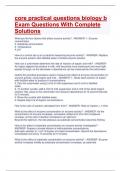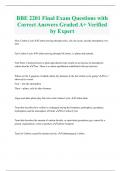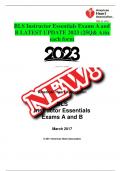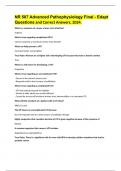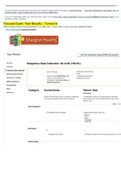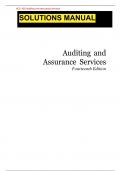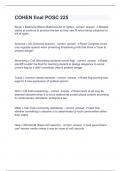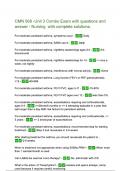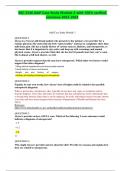Practice Exam Questions and Correct
Answers
Obsessions ✅intrusive thoughts, ideas, images, impulses, or doubts that the person
experiences as senseless and that evoke anxiety.
Most common categories of obsessions ✅-germs and contamination
-guilt and responsibility for harm or mistakes
-taboo thoughts about sex, violence, blasphemy
-the need for order and symmetry
Compulsions ✅Compulsions are urges to perform overt (e.g., checking, washing) or
mental (e.g., praying) rituals in response to obsessions or to reduce anxiety or distress.
Common mental compulsions ✅Decontamination, checking, repeating routine
activities, ordering and arranging, and mental rituals
When should mental activity be considered a compulsion? ✅Compulsions are
senseless and excessive, and often need to be performed according to rules.
They are also intentional, in contrast to mechanical or robotic repetitive behaviors such
as tics.
They are performed to reduce obsessional anxiety about
particular feared consequences that the individual can articulate
What sets clinical obsessions apart from other types of repetitive thinking?
✅Obsessions are experienced as unwanted or
uncontrollable in that they intrude into consciousness
The content of obsessions is incongruent with the individual's belief system and is not
the type of thought the person would expect of himself or herself.
Finally, obsessions are resisted
Neutralization ✅The sense that obsessive thoughts must be "dealt with," neutralized,
or altogether avoided.
The motivation to resist is activated by the fear that
if action is not taken, disastrous consequences may occur
, Behavioral avoidance in OCD and what is the purpose? ✅-Intended to prevent
obsessional fears and compulsive urges altogether
-The aim of avoidance might be to thwart specific consequences such as contamination
or illness, whereas in other instances avoidance is focused on preventing obsessional
thoughts from occurring in the first place
Subtypes of OCD ✅1. Contamination (contam. obsessions & decontam. rituals)
2. Responsibility for harm and mistakes (aggressive obsessions and checking rituals)
3. Incompleteness (obsessions about order or exactness & arranging rituals)
4. Unacceptable taboo violent, sexual, or blasphemous thoughts with mental rituals
DSM specifiers for insight ✅-good or fair insight
-poor insight
-absent insight
Tic-Related OCD ✅a subtype of OCD in which the individual has a history of tic
disorders, such as Tourette's syndrome.
appears to run in families; involves an early onset and male predominance.
obsessions typically concern symmetry and exactness, and their compulsions often
involve ordering and arranging.
Can you rule out a diagnosis if a patient doesn't know their fears are excessive? ✅4%
of patients are convinced that their symptoms are realistic (i.e., they have poor or
absent insight.)
Poorer insight appears to be associated with religious obsessions, fears of mistakes,
and aggressive obsessional impulses
Symptom accommodation ✅Accommodation occurs when a friend or relative
participates in the loved one's rituals, facilitates avoidance strategies, assumes daily
responsibilities for the sufferer, or helps to resolve problems that have resulted from the
patient's obsessional fears and compulsive urges
Other interpersonal aspects that play a role in the maintenance of OCD ✅Relationship
stress and conflict
Couples w/ one partner w/ OCD often report problems with interdependency,
unassertiveness, and avoidant communication patterns that foster stress and conflict


